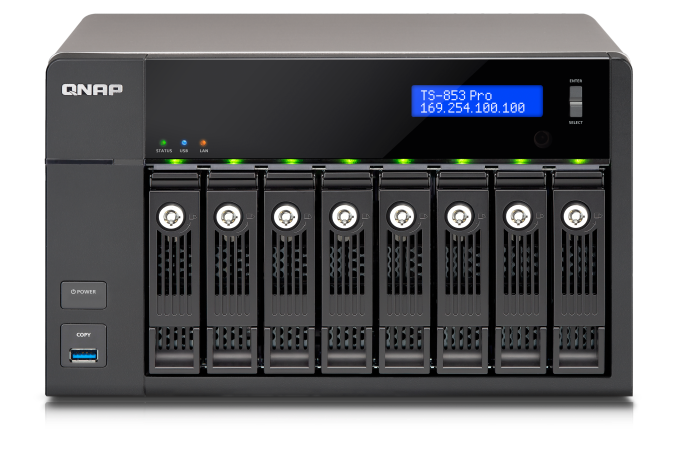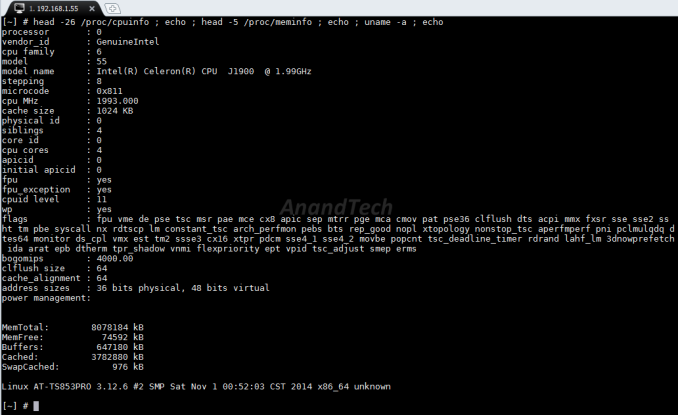QNAP TS-853 Pro 8-bay Intel Bay Trail SMB NAS Review
by Ganesh T S on December 29, 2014 7:30 AM EST
Introduction and Testbed Setup
QNAP has focused on Intel's Bay Trail platform for this generation of NAS units (compared to Synology's efforts with Intel Rangeley). While the choice made sense for the home users / prosumer-targeted TS-x51 series, we were a bit surprised to see the TS-x53 Pro series (targeting business users) also use the same Bay Trail platform. Having evaluated 8-bay solutions from Synology (the DS1815+) and Asustor (the AS7008T), we requested QNAP to send over their 8-bay solution, the TS-853 Pro-8G. Hardware-wise, the main difference between the three units lie in the host processor and the amount of RAM.
The specifications of our sample of the QNAP TS-853 Pro are provided in the table below
| QNAP TS-853 Pro-8G Specifications | |
| Processor | Intel Celeron J1900 (4C/4T Silvermont x86 @ 2.0 GHz) |
| RAM | 8 GB |
| Drive Bays | 8x 3.5"/2.5" SATA II / III HDD / SSD (Hot-Swappable) |
| Network Links | 4x 1 GbE |
| External I/O Peripherals | 3x USB 3.0, 2x USB 2.0 |
| Expansion Slots | None |
| VGA / Display Out | HDMI (with HD Audio Bitstreaming) |
| Full Specifications Link | QNAP TS-853 Pro-8G Specifications |
| Price | USD 1195 |
Note that the $1195 price point is for the 8GB RAM version. The default 2 GB version retails for $986. The extra RAM is important if the end user wishes to take advantage of the unit as a VM host using the Virtualization Station package.
The TS-853 Pro runs Linux (kernel version 3.12.6). Other aspects of the platform can be gleaned by accessing the unit over SSH.
Compared to the TS-451, we find that the host CPU is now a quad-core Celeron (J1900) instead of a dual-core one (J1800). The amount of RAM is doubled. However, the platform and setup impressions are otherwise similar to the TS-451. Hence, we won't go into those details in our review.
One of the main limitations of the TS-x51 units is the fact that it can have only one virtual machine (VM) active at a time. The TS-x53 Pro relaxes that restriction and allows two simultaneous VMs. Between our review of the TS-x51 and this piece, QNAP introduced QvPC, a unique way to use the display output from the TS-x51 and TS-x53 Pro series. We will first take a look at the technology and how it shaped our evaluation strategy.
Beyond QvPC, we follow our standard NAS evaluation routine - benchmark numbers for both single and multi-client scenarios across a number of different client platforms as well as access protocols. We have a separate section devoted to the performance of the NAS with encrypted shared folders, as well as RAID operation parameters (rebuild durations and power consumption). Prior to all that, we will take a look at our testbed setup and testing methodology.
Testbed Setup and Testing Methodology
The QNAP TS-853 Pro can take up to 8 drives. Users can opt for either JBOD, RAID 0, RAID 1, RAID 5, RAID 6 or RAID 10 configurations. We expect typical usage to be with multiple volumes in a RAID-5 or RAID-6 disk group. However, to keep things consistent across different NAS units, we benchmarked a single RAID-5 volume across all disks. Eight Western Digital WD4000FYYZ RE drives were used as the test disks. Our testbed configuration is outlined below.
| AnandTech NAS Testbed Configuration | |
| Motherboard | Asus Z9PE-D8 WS Dual LGA2011 SSI-EEB |
| CPU | 2 x Intel Xeon E5-2630L |
| Coolers | 2 x Dynatron R17 |
| Memory | G.Skill RipjawsZ F3-12800CL10Q2-64GBZL (8x8GB) CAS 10-10-10-30 |
| OS Drive | OCZ Technology Vertex 4 128GB |
| Secondary Drive | OCZ Technology Vertex 4 128GB |
| Tertiary Drive | OCZ Z-Drive R4 CM88 (1.6TB PCIe SSD) |
| Other Drives | 12 x OCZ Technology Vertex 4 64GB (Offline in the Host OS) |
| Network Cards | 6 x Intel ESA I-340 Quad-GbE Port Network Adapter |
| Chassis | SilverStoneTek Raven RV03 |
| PSU | SilverStoneTek Strider Plus Gold Evolution 850W |
| OS | Windows Server 2008 R2 |
| Network Switch | Netgear ProSafe GSM7352S-200 |
The above testbed runs 25 Windows 7 VMs simultaneously, each with a dedicated 1 Gbps network interface. This simulates a real-life workload of up to 25 clients for the NAS being evaluated. All the VMs connect to the network switch to which the NAS is also connected (with link aggregation, as applicable). The VMs generate the NAS traffic for performance evaluation.
Thank You!
We thank the following companies for helping us out with our NAS testbed:
- Thanks to Intel for the Xeon E5-2630L CPUs and the ESA I-340 quad port network adapters
- Thanks to Asus for the Z9PE-D8 WS dual LGA 2011 workstation motherboard
- Thanks to Dynatron for the R17 coolers
- Thanks to G.Skill for the RipjawsZ 64GB DDR3 DRAM kit
- Thanks to OCZ Technology for the two 128GB Vertex 4 SSDs, twelve 64GB Vertex 4 SSDs and the OCZ Z-Drive R4 CM88
- Thanks to SilverStone for the Raven RV03 chassis and the 850W Strider Gold Evolution PSU
- Thanks to Netgear for the ProSafe GSM7352S-200 L3 48-port Gigabit Switch with 10 GbE capabilities.
- Thanks to Western Digital for the eight WD RE hard drives (WD4000FYYZ) to use in the NAS under test.











58 Comments
View All Comments
milkod2001 - Monday, December 29, 2014 - link
I could understand this unit to be used by business users who need to have ready to go solution, don't mind the cost,don't have enough IT skills or are not willing to pay IT Pro to get similar or better system build for less then half price.But for home users this is definitely overkill and price wise a madness. Would love to see more down to earth 2 - 4 bays NAS units reviewed, some roundup(4-5 options).
keep up good work guys, thanks
PaulJeff - Monday, December 29, 2014 - link
Agreed. The cost for something like this for even a home pro-user is insane. I would like to see Ganesh do a ZFS shootout based on price with FreeNAS (or similar). For the cost of these NASs, I can build a crazy fast ZFS NAS with SSD L2ARC and 4x 1Gbit NICs.I propose Anandtech/Ganesh do a DIY NAS comparison based on price and feature tiers.
nathanddrews - Monday, December 29, 2014 - link
All these COTS solutions seem so expensive for what you get - especially for the DIY portion of AT's readership. The obvious tradeoff is buying something functional from the start for a high price or spending a lot of time building something less expensive.A review/comparison of soft-RAID, home-build NAS/server devices would be nice, but understandably time consuming. Two or three tiers of hardware (Atom-class vs i-3-class vs Xeon-class), two or three tiers of OS (UnRAID, Windows Server/Windows 8.1, Stablebit DrivePool, FreeNAS), and then just a preset number of drives (four? eight?) for all of them.
PaulJeff - Monday, December 29, 2014 - link
I considered buying a FreeNAS Mini from IXSystems (FreeNAS OEM). I'm too lazy to request a quote, but I suspect that for what you get hardware-wise would be price competitive with what AT normally reviews.I do agree that, though time consuming, it would be well worth the effort to do a comprehensive DIY vs COTS NAS and with benchmarks to follow.
My FreeNAS box, (ASUS P9A-I, 16GB ECC RAM, 128GB SSD L2ARC and 6x 4TB HGST RAIDZ2), run cycles around most COTS NAS at half the price (minus HDD).
DanNeely - Tuesday, December 30, 2014 - link
Dunno why they have the request a quote option (maybe for business customers whose burrocrazy needs a PO instead of a number off the webpage?) because the pricing tab has actual prices. The FreeNAS Mini is $995 without disks and has prices for 4-24TB (pre-redundancy) configurations along with options for more ram and SSD caches.ap90033 - Friday, January 2, 2015 - link
That would be a useful Review!!!!Adrian3 - Monday, December 29, 2014 - link
I'll be buying one of these very soon for home use. Why do you think it's insane? I'll be populating it with eight 6TB Red drives - the cost of the unit is a fraction of the cost of the drives. I want something that is fast, can do transcoding, is metal instead of plastic, has a small footprint, low power usage and easy to set up. So, what's the alternative that fits those requirements?Morawka - Tuesday, December 30, 2014 - link
can these little baytrail units even do realy 1080p on the fly transcoding? i was under the impression that they were to slow for hi def content like for a plex server.Adrian3 - Tuesday, December 30, 2014 - link
Yes - definitely. Read the section "Real-time & offline HD video transcoding" on this page: http://www.qnap.com/i/uk/product/model.php?II=151nathanddrews - Tuesday, December 30, 2014 - link
I can tell you right now with 100% certainty that Bay Trail can't do that - it can barely transcode one stream, let alone five. They must have extra embedded silicon dedicated to the process - which explains some of the cost of the unit. Reading through the details, it seems obvious that they have a means for transcoding through the built in hardware:"Transcode Full HD videos on-the-fly or offline with QNAP’s unique transcoding technology. It allows for up to 5 devices to simultaneously view different videos stored on the TS-853 Pro with on-the-fly hardware accelerated transcoding.
1. Transcode video files to 240p, 360p, 480p, 720p and 1080p resolution
2. Automatic video transcoding for watched folders
3. Hardware accelerated transcoding support"